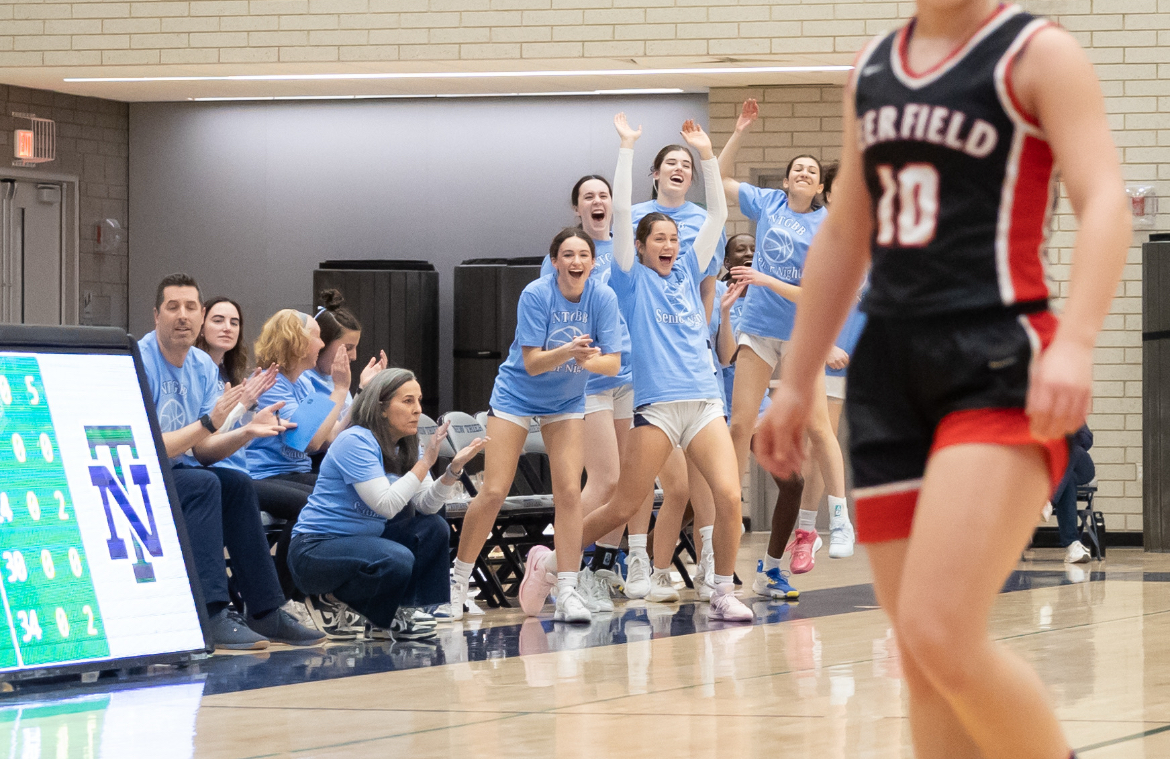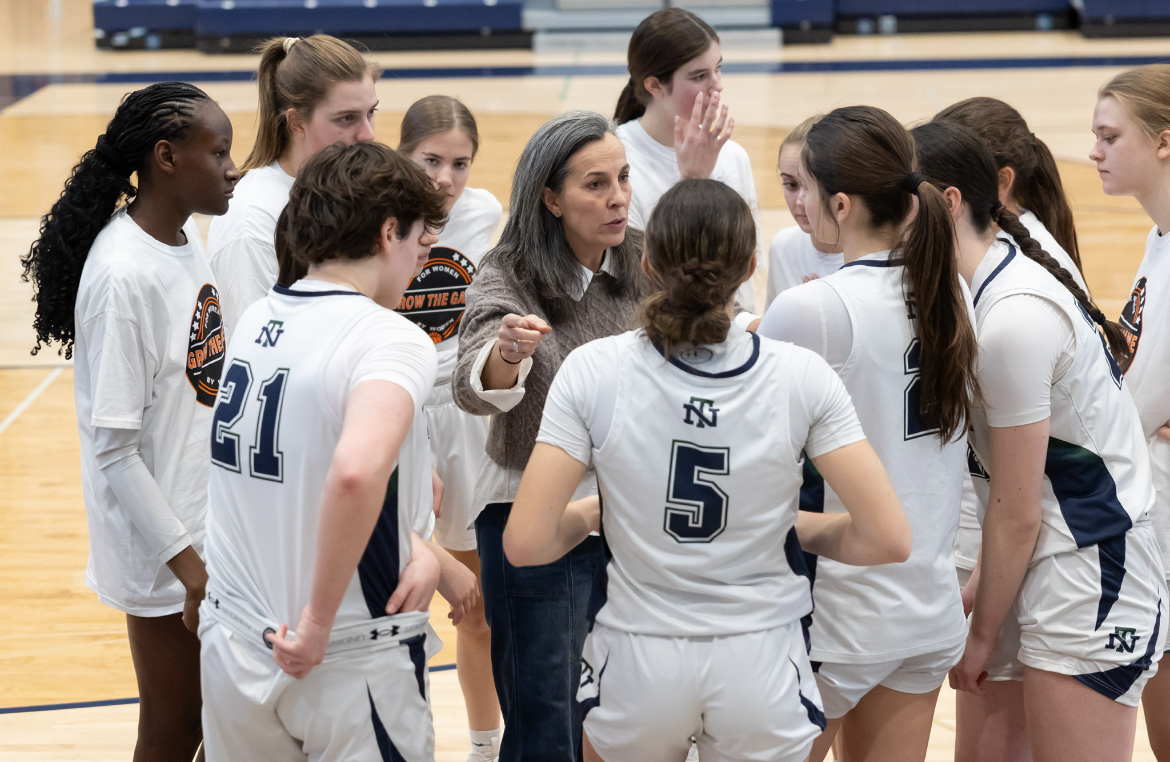“If you’re passionate about something, don’t stop working towards it,” sophomore Emerson Buck, small forward on the girls varsity basketball team, said.
Clearly, this is a mantra that the New Trier’s girls basketball team lives by. However, this team would not embody these same values if not for head coach Teri Rodgers, who has molded the program as we know it.
After 27 strong head-coaching seasons, Rodgers (affectionately called Rodg by students) is retiring at the end of the 2024-2025 school year. She has cultivated a vibrant and close team atmosphere by pushing boundaries and empowering her players to be their very best Rodgers has been a trailblazing figure for girls basketball in Illinois, coming from her own high school and college basketball career at Duke University, and now holding a seat in the Illinois Basketball Coaches Association Hall of Fame.
One of her favorite highlights of her career has been co-founding the Grow the Game tournament, which was created in 2019.
“Myself and a few other female coaches got together for dinner about six or seven years ago, and talked about what we wanted in terms of growth for basketball in the state, or what we felt was lacking in what we had hoped to do,” Rodgers said. “There were some pretty prominent tournaments that were being run, and we wanted to create our own, to kind of take back the game. We felt like women weren’t as involved in the game as we needed to be.”
In Illinois, only 26% of high school girls basketball teams are coached by women, Rodgers said. Knowing that, the coaches decided to share the leadership and work, in order to grow the game, hence the tournament’s name.
“It started with one tournament, and we had every team in it coached by a woman, and we also had female officials,” Rodgers said. “One of the things we’ve discovered is that the women officials kind of have some of the same challenges that we do as women coaches, and so it’s been great to connect with them.”
Once people saw the importance and success of the Grow the Game tournament, the number of participants rapidly increased. They started with 14 teams, and this past year, had 49. The tournament now boasts teams coming from other states, namely Iowa, Wisconsin, Indiana, Georgia and more.
“One of our premises is that we want young girls to see that women can lead,” Rodgers grinned. “We want young girls to know that their voice is important. Whether that voice is on the athletic field, at home with a spouse, or if it’s in a business boardroom, that their voice is equally as important as anybody else at that table. Seeing women lead, officiate, and be in charge is such a valuable thing for young girls to see.”
Although the tournament was originally meant for teams with female head coaches, it has expanded, allowing programs with male coaches to participate—under one condition.
“For programs with male coaches, they’ve still joined and just had their female assistant coach coach that game,” Rodgers explained. “We know that when women get an opportunity, we do a great job.”
Going beyond that specific tournament, challenging sexist stereotypes has been a large goal of New Trier’s basketball program under Rodgers. Especially with New Trier offering more than 35 sports, certain sports are not always supported equally. While the athletic department and school do a great job of providing equal opportunities like gym time and resources, there is still a lot of work to be done.
“Last year during our home doubleheader, the school was selling one ticket for both games and attendees couldn’t get in without a ticket,” senior guard Anna Rivera said. “The tickets quickly got sold out, going to everybody who wanted to go to the boys game, and there were no tickets left for anyone who wanted to come to the girls game. The worst part was those with tickets didn’t even go to the girls game, which was before the boys, so there was barely any support for us.”
For this year’s doubleheader game on Jan. 31, the tickets are being sold the same way, with one ticket for both games, and are set to sell out right away. There was a presale code for the families of the players, to make sure they could obtain tickets before they sold out.
There has also been inequity online, with a disparity in support between boys and girls sports teams. Buck suggested that fans may pick and choose who to support and that some of the girls teams that get less support are those during clashing seasons where there is also a very popular boys team.
“The boys basketball team, going to state the last two years, have been getting a little more recognition than we’ve had online. Also with social media, the guys get posted a lot more than we do, on barstool and other accounts,” junior guard Avery Schecter said. “They get a lot more attention than we do, which I think carries over to more people coming to the games.”
Basketball is considered a contact sport, however the refereeing of contact during the girls games has proven to be another challenge. Both female coaches and athletes get treated differently than males, with male athletes being allowed a lot more contact and roughness without being fouled, and male coaches being allowed to get more aggressive in their coaching.
“You can brush someone’s shoulder, and the refs will whistle and say it’s a foul. In the boys games, they’re diving on the floor, running into each other, and everyone claps and it’s a good game,” Rivera said. “During our Dundee crown tournament, there was a female coach on the other team, who was coaching and yelling at her team like normal. She asked for a timeout, and for some reason, the ref gave her a tech [technical foul]. Rodg turned around and asked what happened and everyone, including the spectators, was so confused. I think it’s because she was proud and aggressive as a woman, which is looked down on.”

While it’s an uphill battle towards gender equality in many facets of life, Rodgers works hard to ensure her team stands up for themselves and knows their worth. She has implemented several rituals and traditions such as team dinners and activities, hoping to bring her girls closer together and strengthen their spirits.
“My favorite pre-game ritual is when we all sit in a circle and hold hands and sort of meditate together,” Buck said. “Then we do a clapping pattern right before we run out and it just kind of gets us all in the same place, present and ready for the game.”
As mentioned by Buck, one of the most notable traditions of the team is their pre-game circle. Right before the team goes onto the court, they all dive in a big circle and share positive and encouraging words. That helps the team get hyped up for the game ahead and build the team mentality critical to winning.
“We’ve talked a lot about circles being inclusive, and it’s one of the things I’m most proud of in our team culture. My whole idea is I want to give as many kids a positive experience as possible,” Rodgers gushed. “One of the hallmarks of our program has been an inclusive and well-rounded team, like a family, and so a circle represents that philosophy.”
While New Trier and the girls basketball program are sad to see Rodgers go, many feel that she has made a lasting impact on the team atmosphere and the players themselves.
“Rodg always says progress isn’t linear,” Buck said. “You have to keep working towards something, even if you don’t always see the results you want right away.”
She is a role model for girls across the state, from her high school players all the way down to the young girls on the Storm travel basketball feeder teams that come to watch the Trevians play.
“My favorite memories have been the relationships I’ve built with kids and the relationships they’ve built with each other,” Rodgers said. “There was a group that graduated about 12 years ago who were all in Utah together on vacation, and they had their New Trier gear on. They sent me a picture, and I thought that was really neat. Obviously winning games and some championships has been really exciting, but what I love about those is that the team just got to stay together longer.”
The lessons that Rodgers has taught her players are described as immeasurable and inspirational to the program. The values and relationships formed on this team are ones that the players can take with them throughout their entire lives. She has truly grown the game, both for female athletes and women as a whole.
“I would love to see these young girls coach their son’s basketball team someday,” Rodgers said. “I want them to know they can do it, just like a father can. To not back down and to make sure that their voices are heard and valued.”








































